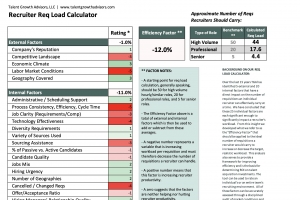2014 Talent Management Best Practices

Talent Management Best Practices Are Changing
Here’s proof about the extent to which the business landscape, and specifically talent management best practices, is changing: (Bersin by) Deloitte’s recent research report, “Predictions for 2014,” features an in-depth analysis of how companies need to retool their human resources operations to keep up with the changing times. It pegs 2014 as “the year to focus on ‘optimizing’ HR to focus on the delivery of talent services, performance consulting, and deep expertise in management, coaching, and recruiting.” HR teams also need to focus on the acquisition of top-notch talent. Companies are realizing this as well, as two-thirds of the firms Deloitte reached out to have acknowledged that they are beginning to go through some form of HR alteration. With talent management best practices constantly growing, human resources must measure its value by “its ability to source, attract, retain, and build talent— not simply its ability to deliver service to employees.” Phrases such as “keeper of the corporate talent system” and “architect of the talent machine” are now being used to describe HR departments. New titles and new strategic responsibilities indicate the need for key upgrades in the department’s capabilities as well.
Talent Management Best Practice #1: Redefine HR
Deloitte’s “High-Impact HR” research sees these new challenges for HR departments as an opportunity to improve its competencies. Several key principles for redesign are laid out. For example, Deloitte believes that within the human resources department, the business-partner role should be altered. They instead suggest more of a “strategic adviser” who would be “serving as a ‘vice president of talent’ and a strategic consultant to the business.” Another principal proposed is the reduction of the role of an “HR generalist.” Deloitte claims this role is better suited as an “HR specialist.” This specialist would focus on “recruiting, organizational development, employee relations, and compensation.” While each specialist would be located or assigned to a particular business, the specialists would work together to operate as a “network of expertise.”
Talent Management Best Practice #2: Develop Talent
Deloitte suggests further internal improvements within the human resources department. With the increasing need for specialized individuals within an organization, a better-trained and more highly developed human resources team is necessary. Deloitte advises focusing on “making everyone within HR a ‘master craftsman,’” able to utilize relevant tools and data to better leverage their role and drive relevant results. To develop the rich capabilities necessary for such a successful HR department, the research indicates a need for internal training, certification, and data-based development. The hiring of CHROs, who is able and willing to “push for innovation and new solutions, ” is reinforced as well. By doing this, the human resources department can remain in sync with the overall company. Along with these improvements, Deloitte also looks at improvement options based on outside observations. For example, an “intense focus on external intelligence, research, benchmarking, and the continuous scanning of new tools” will help human resources departments further recognize ways to better their improvement.
Talent Management Best Practice #3 - Simplify Processes and Strategies
Finally, the research report places an emphasis on the power of simplification. Companies cite “overwhelmed employees” as one of their biggest challenges. While newer human resources technology may be designed to feature “complex competency models,” making processes simple and reducing the intricacy of some procedures may maximize efficiency.
As business strategies and processes continuously shift, company departments need to look for various ways to maintain satisfactory standards in talent management best practices. The valuable improvements offered by Deloitte’s “Predictions for 2014” research report provide an opportunity for companies to reevaluate less than optimal areas within their HR functions. As companies strive for greater success, their human resources departments will need to utilize these tips to become (or remain) the “steward of the ‘talent system’” – clearly something their companies need.
In some cases, we've been talking about these talent strategy issues for years (integrated talent management, HR strategic partners, HR analytics, etc.) Is 2014 the year we'll finally see some fundamental strategic changes in HR?
Share this Article
Learn more about our unique approach to Talent Strategy Formulation.



